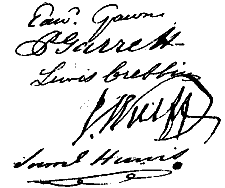
[From The Manxman, #10 1913]
The Story of the Mails and the yarn of old "Mac," his Two Pounds and his Scottish Admonition.
"The real start of the Steam Packet Co began in the street, in the shops, in the houses, on the fishing boats, and in the fields."
What is the real beginning of anything? " George Eliot," than whom no woman writer with a more philosophic mind ever lived, says in one of her novels, " No retrospect will take us to the true beginning." I am led into this because I want to establish the true beginning of the Isle of Man Steampacket Co. The task is a hard one. Doubtless the true beginning was the first mutterings of discontent by worthy Islanders, long since dead and gone, at the delays and annoyances caused by the St. George's Steampacket Co.'s shockingly illequipped vessels, like the Prince Llewellyn and Orinoco, which took from fifteen to thirty hours over the winter passage with the fortnightly mail. A fortnightly mail! And that to an Isle of Man which then had but about ten thousand fewer inhabitants than it has to-day. These mutterings and grumblings continued throughout the years 1828 and 1829. when fresh adherents were being constantly added to the growing army of objectors. These found natural leaders in the Moore family. I should say that the real start of the Isle of family. Steampacket Co. began in the street, in the shops, in the houses, on the fishing boats and in the fields.
Somebody had evidently got together a preliminary committee, but how, or of whom, or when, there is no record whatever.
This committee formally met for the first time at the Auctioneers' Warehouse of Messrs. Dixon & Steel, in Douglas, on December 17th, 1829. We must assume, therefore, that these gentlemen were among the original grumblers and the earliest supporters of the new cause.
A second meeting of this Committee was held at Mr. W. Quiggin's Office, in Douglas, on December 19th, 1829, and a third meeting, also at Quiggin's, on the 22nd December. The Quiggin firm, widely known and highly respected, is still in existence.
Now, when you come to have three meetings within six days you must admit that the matter was very serious and the men most determined. It was during these six days that a good deal of the original capital was promised.
The first meeting of the proprietors (as they are then so described in the minutes) was on January 5th, 1830. What, therefore, is our verdict to be? To my way of thinking the I. O. M. S. P. C. was formally constituted on December 17th, 1829. We must take a date, and there are better reasons for preferring that to any of the others. At any rate, I have set down all I know, which has been my engagement with the readers of the " Three-legged Magazine " from its start.
And now let us have a few more Minutes with the Minutes, for, in the light of present-day affairs, they are very entertaining.

Good writing by good men in the "thirties." Directors' signatures in the year 1834
You know that the original trouble was the incompetent way in which the St. George Co.then the biggest and richest steamship concern in Liverpool-carried the mails. You know that their Sophia Jane was beaten by our first Mona's Isle. You know that they then put their great packet St, George (bigger than ours) on the Douglas station. You know that we even beat her. You know that she was wrecked on St. Mary's Isle-Conister, Tower of Refuge Rock, or what you please-in November, 1830. You know that the old, bad boats came back again. You know that the old mail grumblings re-commenced. You know that the St. George Co. offered to abandon the whole thing. So we start from this Wednesday, 29th December, 1830. At a meeting of the Directors held this day, at the Steampacket Office, it was unanimously resolved that the transfer of the Mail Contract by Mr. Hutchinson, in the name of the St. George Co., under the consideration of their withdrawing from the Isle of Man station, be rejected unless the St. George Co. enter into an engagement to supply a vessel for the conveyance of the mails in case of any accident occurring to the Mona's Isle to prevent her plying.
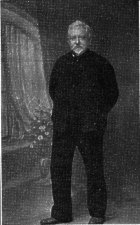
Mr. John Casement, one of the most respected, and the senior
servant of the Co. still on duty, in the engineering works.
He formerly sailed for many years as chief engineer
You see the point. If they took the contract over and their only steamer broke down, what would happen then? The names of the cautious fellows who signed this minute were-Edward Gawne, Robert Banks and P. Garrett.
On the 11th January, 1831, they appear to have offered certain other terms to the St. George's Co. They also appear not to have had a prompt answer, hence the following:
January 19th, 1831. At a meeting of the directors held this day, it was unanimously resolved that, if the transfer of the mail is not satisfactorily concluded by the St. George Company, on the Mona's arrival at Liverpool, the negotiations shall cease and the sum of Forty Pounds be required for the conveyance of the mail to and from Liverpool weekly.
Do not forget that I am dealing with what is now the oldest continuous sea mail carrying service (by steam) in the world. It is, therefore, as desirable as it is interesting, to have the particulars of its start complete.
The St. George Co. evidently did not accept the terms offered, which, must: say, were fairly. stiff. Instead, they got the mails carried by any odd steamer which would agree to call on her way to Glasgow. Then the public grumbling re-commenced, worse than ever. On March 16th, 1831, the directors told their Agent, at Liverpool, that he could accept the X40 per week, in which case the Mona's Isle would sail twice instead of once. As far as I can make out the St. George Co. still declined. Trouble was brewing in that quarter. "'rhe agents and imsmanagers of the St. George Co. have been dismissed." said a newspaper at the time. The " Manx Sun " reported that the Mona's Isle had received X40 for a week's mail carrying, as far back as March 1st, 1831, but this I cannot verify. There is little more to tell. How did the matter end? By May the PostmasterGeneral had stepped in and cancelled the St. George contract.
On May 24th, 1831, the present Company tendered to the G.P.O. for the carriage of the mails for the sum of X1,000 per annum. The G.P.O. then did a little leisurely quibbling till, on July 12th, 1831, they officially started with the Manx Co., and have so continued ever since, with varying additions from time to time.
Two exact dates are thus arrived at. We first unofficially carried the mails on December 20th, 1830, and first officially carried them on July 12th, 1831. It is now, as I have said, the oldest mail service in the world, by steam alone and between the same ports, without a break.
I estimate that we have 'made over 70,000 passages with the mails, one only, from the Ellan Vannin, being damaged during the whole of this long time, a veiry wonderful average indeed.
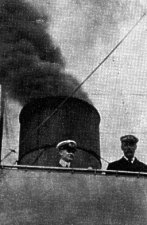
Present day: A study in smoke
Having now dealt with the more or less serious question of the actual start of, and the carrying of the mails by our boats, let us now turn to the lighter side of the early life of the Company. You know the management of the small business in 1830 was rather different from that of the large one in 1913. However, the then directors seemed to blend generosity with shrewdness in a most remarkable way.
On the 9th February, 1831, it was resolved " That Captain Gill be debited £2 for deficiency in the stewards' furnishing," which I suppose would mean that the victualling stores were short to that extent. This is an example of the shrewdness, but then comes, " That John Kneale, seaman, in consideration of an accident received whilst engaged in his duty, be allowed twenty shillings," which supports the generosity. You must not overlook the fact that twenty shillings could buy vastly more then than would now be the case. Oh! ever so much more.
Wednesday, March 2nd, 1831, " That the sum of 6C10 13s. 6d. received from Captain Harris for the conveyance of his detachment be returned to him, and that a petition be forwarded to the War Office asking for payment four freight for the said detachment." I wonder what. the War Office said. You will remember that our boats were once called " The Isle of Man Royal Mail and War Office Packets." The War office in those days undertook the rfúty of carrying mails by sea, one service of theirs being the now venerable Holyhead and Dublin journey. These mails were carried in Government steamers, while the Manx mails went in our vessels. The Government stopped using their ships, but we did not, and this is what makes us the oldest mail shippers. On the last date I have quoted the directors "wrote to Sir Francis Freeling respecting the mail contract."
And what else? This, "That Captain Gill be allowed 3d. extra per day for the board of the seamen, making one and threepence for each man per day." Manxmen are noted for respectable appetites, and they had evidently gone above the limit of a shillingsworth. It was a hungry job, too, for they had sails to work and steered aft, by hand. But herrings were cheap, and other things as well.
Thursday, 7th July, 1831, " That the Agents be presented with £10 each for their great attention to the interests of the proprietors in the fulfilment of their duty for the past year. Also that Captain William Gill be presented with the same sum in testimony of their approbation of his zeal and attention as commander of the Mona's Isle."
I told you that they could be generous. Now, listen to this. " That the sum of Five Pounds British be given to the Regatta Fund." There ought to be a Mans Government Cup for a race round the Isle of Man after the Midnight Race. If the Government are too slow, how about a Steampacket Cup, to be held for a year by the winning boat?
July 7th, 1831, seemed to be a great day in various directions: " Resolved that an allowance of £7 10s. 0d. per annum be made to Captain Gill for spirits for the use of the vessel." Sixpence a day for the lot of them. Very moderate, indeed. It was the custom then, you know, to give sailors a " tot " when work was hard.
There then comes an entry which will probably interest the grandsons of the late Mr. Thomas Orford, who himself was not even conneeted with the concern quite as early as 1831. On August 9th, a tremendous resolution was passed, and signed, in splendid handwriting, by Edward Gawne, William Hinds, Francis Matthews, Robert Banks and Edward Forbes. Here it is:
It was resolved that the salaries of the Agents be advanced to £100 per annum, commencing on the 1st July last, with the understanding That they are prohibited making any charges for forwarding Parcels, etc., and are only allowed to debit the concern with cash actually paid by them.
What a grand time Agents must have had in those days!
Yet the directors seem to have been the worthiest of men. Here they are once more in the generosity department :
General Meeting, January 10th, 1832. That the thanks of the Mona's Isle owners, accompanied by £100 and a suitable letter, be presented to Captain William Gill in testimony of their high regard for his services in the command of the Mona's Isle, particularly his unprecedented perseverance in effecting a passage, on the memorable 19th August, during a gale of wind, from the N.N.W., which prevented their opponent, the William the Fourth, from leaving the Port of Douglas.
The fame, skill, courtesy and tact of Gill are universally admitted, his memory standing just as high to-day as ever. There ought to be a bust or medallion of him outside our Liverpool Office, for he discovered the channel into the Mersey. Let me see! What did R. L. Stevenson once write to his cousin Bob, from Samoa? "St. Gaudens has arrived here from Paris and I aO going to be either busted or medallioned, I 'don't know which. Probably busted, but I'll let you know shortly." I'd like to make the same prophetic joke at the expense of Gill.
I think we have now done enough in the ancient lore line for the present, but I can promise you more highly-interesting old reminiscences for next month. We have still one or two other points to mention, however. First constable appointed.
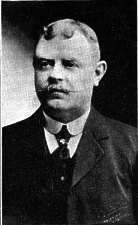
Detective-Sergt. Kelly, who holds three special medals gained during twenty-five
years good conduct service.
One is a Coronation Medal
For instance, I saw the following in one of the Manx papers:
" Detective-sergt. Kelly, one of the oldest of Liverpool detectives, and a Manxman, has been appointed a special officer on the steamer Ben-my-Chree. Mr. Kelly has retired from the Liverpool force after 28 years' service, during which time he has been engaged in investigating many important criminal cases. Never once has he been brought before a superior officer for misconduct, and he leaves the force with an excellent record."
As I like to be of service to new comers, perhaps Mr. Kelly might find a special interest in glancing over this item:-" March 6th, 1832. That Thomas Cleator be offered£20 per annum for his attendance as Constable on the arrival and sailing of the packets." This was the first occasion when the police were officially employed by the Steampacket Co.
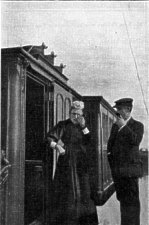
Mrs. Cowell photographed on the Ellan Vannin, the oldest living chief stewardess
Last month, if you recollect, there was a yarn concerning King Orry II. and her first commander which I left over. Here it is:-In 1872 Mr. John McKee was Agent in Belfast, for the then renowned Inman Line. There was also resident in that city Mr. McLaren, an able and highly-respected Presbyterian minister. The former, at odd times, paid visits to Liverpool for the purpose of interviewing the Head Office, but the outing was more or less a pleasure one all the same. On one occasion McKee was walking in Clayton Square, and there he spied McLaren coolly marching into the old Prince of Wales Theatre, for, if a good minister, he was quite a human being as well. " John," said McKee, " Here's a lark-come, at once," and the pair rushed into the Neptune Hotel across the way. Procuring a Sheet of notepaper and an envelope, a letter was promptly written and, for a suitable bribe, the hall porter proceeded to the Theatre, there to bawl out the name of the reverend gentleman and duly deliver the dispatch. The poor man, in great trepidation, came over instantly. He began to explain that he only just wanted to see a. certain point in the performance, etc., etc., but the explanation was rather coldly received and McKee pulled him up short. "I tell you what," said he, "We're going to the Isle of Man and you've got to come with us for four days' holiday, or - I'll split on you when I get back to Belfast!" This further terrified the reverend gentleman, and besides, he was unpleasantly conscious that he had not brought funds with him to face an outlay of the kind. However, they would take no denial and he agreed to come as a guest. Accordingly, on the following morning, there set forth for Douglas a party of six, Messrs. McKee, MacLaren and Phillips, the latter one of our Old Manx Passenger-, each accompanied by their wives. They stayed at the Royal Hotel, did the thing in style, and vastly enjoyed the holiday. Finally there came the eve of departure and the presentation of the bill. When this was paid on the following morning it was found that the total sum of 2s. 9d. alone remained between the six. This, utterly insufficient for breakfasts, was spent on glasses of rum and milk, and the depressed travellers marched on board King Orry (II.), then commanded by that very fine sailor and universally liked Scotsman, Captain Alexander McQueen. Could they go five hours without eating? No. They all marched down into the saloon and partook of the most liberal breakfast which the ship afforded, and that without allowing their appetites to be interfered with by thinking of the hour of reckoning so ominously near at hand. The O. M. P. solved the difficulty. Excusing himself for a moment, he went into Commander McQueen's room. "Captain," said he, "I'm connected with the Inman Line. There are six of us altogether, and we are 'dead broke.' Will you lend me two pounds, and we'll leave our wives in pawn?" Old " MaC"-the fine fellow that he was-put his hand in his pocket and, without further ado, produced the cash. " I will," said he, "with pleasure-that is if you will all promise to come to my room." These terms were considered delightful. The bill for the breakfasts was paid and the tourists set forth to interview their benefactor, as arranged. There they found on the " old man's " table brandy, wine, beer and a box of cigars. " You'd better make yourselves at home," he remarked," and let me warn you of the folly of travelling to the Isle of Man without a few bawbees in your pockets. I should have thought you would have had more sense."
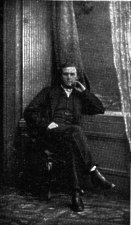
Mr. John Phillips, who borrowed the Two Pounds.
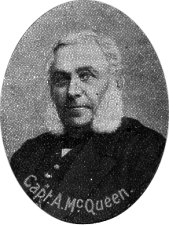
Who promptly lent the Two Pounds.
They took the admonition to heart, and never forgot that dear, fine old navigator, Alexander McQueen, then the handsomest man on the bridge of any steamer coming down the Mersey. The reputation of the Belfast minister was also saved, for they never "split" upon him, and lived happily ever afterwards, except nearly all who are now deceased, including the old ship, King Orry II. But I wonder whether either or both of the two sovereigns are still in circulation ? T. E. E.
|
|
||
|
|
||
|
Any comments, errors or omissions gratefully received
The Editor |
||